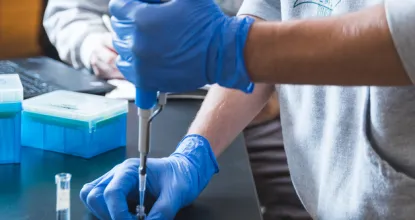
About the Degree
Increasing legitimacy and legality of medicinal plants nationwide has created great demand for qualified technical personnel and great opportunity for the skilled entrepreneur in the cannabis, herbal extract, and natural product industries. Medicinal Plant Chemistry at Northern Michigan University was the first 4-year undergraduate degree program of its kind designed to prepare students for success in the emerging industries relating to medicinal plant production, analysis, and distribution.
Our program has been featured on:

Why Medicinal Plant Chemistry
The field of natural products chemistry, which involves the identification, isolation, and sometimes total synthesis of compounds biochemically produced in existing biota, has a long history of beneficial contributions to the field of medicine. Many pharmaceutical drugs originate from plant secondary metabolite compounds. There is currently a renewed and enthusiastic interest in medicinal plant chemistry as it relates to the herbal extract market and more recently to the emerging cannabis market. With more than three-quarters of the 50 United States currently recognizing the valid and legal therapeutic applications of cannabis, and many of those states and the District of Columbia now fully legalizing both medicinal and recreational consumption of cannabis products, a national shift in policy away from the prohibition of cannabis has been signaled.
With the federal government now on the verge of rescheduling cannabis, the historical stigma associated with the plant is quickly vanishing, and although there is a surge in businesses related to the marijuana economy, there is a major gap in educational opportunities available to prepare people for this field. NMU offered the first 4-year undergraduate degree program that combines rigorous coursework in chemistry and biology with research and hands on instrumental analysis built into the curriculum to prepare its graduates for a career in the cannabis industry. The additional focus on entrepreneurship and laboratory accreditation standards means that our graduates will not only be qualified to perform the instrumental analysis in a laboratory, but will also be empowered to build their own testing laboratory, dispensary, and growing operation from the ground up.
What You'll Learn
The Medicinal Plant Chemistry program at Northern Michigan University is not only unique in its scope and content, but has been designed and organized to promote maximum support and student success through mixed cohorts and a year-long capstone experience.
The required coursework provides a foundation in chemistry (general, organic, analytical and biochemistry) and plant biology, with a capstone research experience involving cultivation of plants and instrumental analysis of natural products. Students choose a focus track to explore their interests in the relevant areas of business and accounting (Entrepreneurial Track), or advanced topics in chemistry and biology (Bio-analytical Track).
Research in the Curriculum
Incoming first-year students will join an inclusive cohort of peers in their winter semester for the Medicinal Plant Chemistry Seminar course. This course includes first-year students enrolled in CH 189, sophomores enrolled in CH 289 and juniors enrolled in CH 389. Students at all levels meet together for seminars presented by invited speakers on topics such as cannabis and the cannabis industry, other medicinal plants, fungi, or other topics of interest. On weeks when there is no speaker, students will meet with their peers (CH 189, CH 289, or CH 389) for general discussions on medicinal plants and plant secondary metabolism, the state of the industry, job opportunities and career paths, literature searching, and experimental design. Students enrolled in CH 389 will additionally develop formal research project proposals, for their capstone projects that will be carried out in their senior year as a part of CH 420 and CH 421, Medicinal Plant Chemistry I and II.
The capstone series of CH 420 Medicinal Plant Chemistry I and CH 421 Medicinal Plant Chemistry II will be taken sequentially in the fall and winter semesters of the fourth and final year in the program, and will explore advanced concepts and apply state-of-the-art techniques associated with the discipline. The lecture component of the course will provide an in-depth examination of the various classes of bioactive compounds and their plant origins, secondary metabolite chemistry, theories of extraction and sample preparation, liquid chromatography-mass spectrometry theory and operation, and good laboratory practices (ISO/IEC 17025). Additionally, the year-long capstone experience will allow sufficient time in the laboratory for students to execute the research projects previously designed in CH 389. Such projects may involve planting of seeds or clones in the greenhouse or grow room, ongoing maintenance of the plants while developing quantitative analytical methods for targeted analyte compounds, harvesting and preparation of the plants for analysis, instrumental analysis of samples, and statistical processing of results. Finally, the capstone experience culminates with a research seminar where the students present their findings to the Medicinal Plant Chemistry students and to the Department.
Program News
News Coverage
Conferences
- Dr. Brandon Canfield and his students presented their research at the American Chemical Society meeting in Orlando Florida in March 2019.
- Dr. Mark Paulsen was a panelist at the annual conference of the Institute of Cannabis Research on the campus of Colorado State-Pueblo in March. The presentation was part of a session on Cannabis across the curriculum.
- Dr. Lee Roecker was a panelist at the Medical Cannabis symposium held on the campus of NMU in October 2018.
- Dr. Mark Paulsen was a panelist at the CannaMexico conference held in Guanajuato Mexico in May 2018
Listen to Dr. Alex Wilson talk about the Medicinal Plant Chemistry Program!
NMU’s Medicinal Plant Chemistry degree was the first 4-year undergraduate degree of its kind in the nation designed to prepare students for success in the emerging industries relating to medicinal plant production, analysis, and distribution. While not specific to cannabis, Medicinal Plant Chemistry leads the way for chemists to enter a growing field.
The NMU “ecosystem” of related programs has developed to offer opportunities in many areas related to the cannabis industry. You can view NMU's other cannabis-related degrees, certificates, and non-credit programs at the link below.
